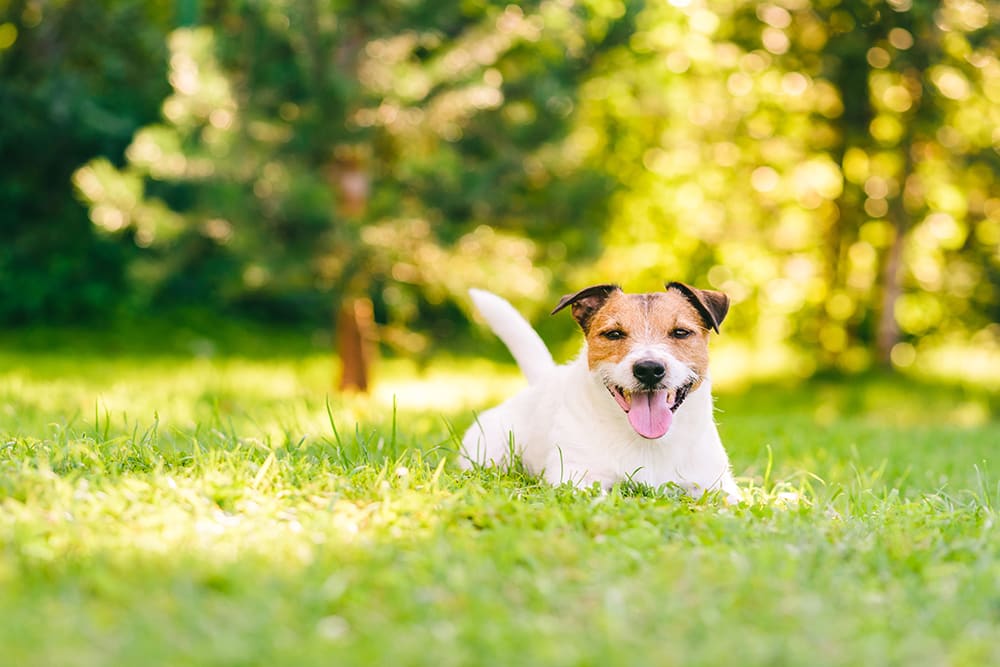While hot sunny days can be a real treat for many of us, warmer days mean an increase in the risk of heatstroke for our pets. Heatstroke can be a fatal condition so it's important for pet parents to know the signs of heatstroke in dogs, and what to do if your dog has heatstroke. Our Cordova vets explain...
Heatstroke in Dogs
Heatstroke (or heat exhaustion as it is sometimes called) is a serious, potentially fatal, health threat for dogs. When a dog’s body temperature is elevated above a normal range (101.5°F), hyperthermia (fever) can result.
Heatstroke is a form of hyperthermia that occurs when the heat-dissipating mechanisms in your dog’s body are overwhelmed and unable to deal effectively with excessive heat. When your pup's body temperature rises past 104°F, they enter the danger zone. If body temperature is above 105°F, this indicates heatstroke.
Why Dogs Get Heatstroke
One of the main causes of heatstroke in dogs is being left in a vehicle while the owner runs into a store for 'just a second'. Your vehicle's internal temperature can quickly exceed dangerous, or even deadly, levels on hot summer days. Never leave your dog unattended in your car while you run errands. Your dog's fur coat, combined with the hot summer temperatures, can make what seems like a short stay in a warm car into a life-threatening situation.
But dogs can also suffer from heatstroke simply by spending too much time outside on a warm day. A lack of access to water and shade in your backyard or at the beach can also spell trouble. Shade and water are vital on warm weather days, especially for senior dogs, dogs with long thick coats and dogs carrying excess weight.
Your dog's breed could also be a contributing factor when it comes to heatstroke; flat-faced, short-nosed pups tend to be more vulnerable to breathing issues when the temperature rises. As you might imagine, thick coats quickly become uncomfortable. Every dog (even ones who love spending time outside engaging in activities) needs to be closely supervised when playing outdoors, especially on days when the mercury is rising.
Heatstroke Symptoms in Dogs
Whenever it is hot outside, be sure to monitor your pet and make sure that they have adequate shade and plenty of cool water to drink. Also, watch for these signs of heatstroke in dogs:
- Mental “dullness” or flatness
- Red gums
- Excessive panting
- Drooling
- Signs of discomfort
- Unable or unwilling to move (or uncoordinated movement)
- Diarrhea
- Vomiting
- Collapsing or loss of consciousness
If your dog is displaying any signs of heatstroke it's time to take action.
What To Do If Your Dog Shows Signs of Heatstroke
Fortunately, heatstroke in dogs can be reversed if detected early. If you notice your pup displaying any symptoms listed above, immediately take them to a cooler place with good air circulation. If symptoms do not improve quickly and you are not able to take your dog’s temperature, contact your vet immediately for advice.
Take your dog’s temperature if you have access to a rectal thermometer. If their temperature is above 104°F, this qualifies as an emergency and your dog will need to see a vet. If this temperature is above 105°F, immediately hose or sponge your dog’s body with cool (not cold) water. Pay special attention to their stomach. A fan may also be useful. Contact your vet or your nearest emergency vet for further instructions.
Heatstroke is a very serious condition. Take your dog to a vet right away whether you are able to reduce their temperature or not.
Preventing Pets From Getting Heatstroke
To help prevent your pup from getting heatstroke be very cautious about how much time your dog spends outside or in the sun during the summer. Do not expose your dog to heat and humidity - their bodies (especially those with short faces) are unable to handle it.
NEVER leave your dog in a car with closed windows - even if you park in the shade. Provide your pooch with lots of shade to retreat to and easy access to cool water. A well-ventilated dog crate or specially designed seat belt for dogs may also work well.
Note: The advice provided in this post is intended for informational purposes and does not constitute medical advice regarding pets. For an accurate diagnosis of your pet's condition, please make an appointment with your vet.
If your dog is showing signs of heatstroke contact Germantown Parkway Animal Hospital right away! Our experienced vets can help to get pet feeling better fast.
Looking for a vet in Cordova and Greater Memphis area?
We're always accepting new patients, so contact our veterinary hospital today to book your pet's first appointment.
Related Articles View All
Dog Eye Injury - What to Do
Our vets know you work hard to protect and care for your dog. Nonetheless, eye injuries can happen. Here, we discuss common types of eye injuries in dogs as well as the causes, symptoms, and what to do if your dog has an eye injury.
My Dog Keeps Shaking Their Head. Should I be Worried?
Is your dog repeatedly shaking their head? Today's post explores the subject of head shaking in dogs, what to do, and when to head to the vet.
Why is my dog drooling?
The safety of dog bones has become a contentious topic and one that many pet parents are eager to understand. Are bones good for dogs? What bones can dogs eat safely? Today, we discuss some pros and cons of giving dogs bones, to help you make an informed decision.
Can dogs eat bones?
The safety of dog bones has become a contentious topic and one that many pet parents are eager to understand. Are bones good for dogs? What bones can dogs eat safely? Today, we discuss some pros and cons of giving dogs bones, to help you make an informed decision.

